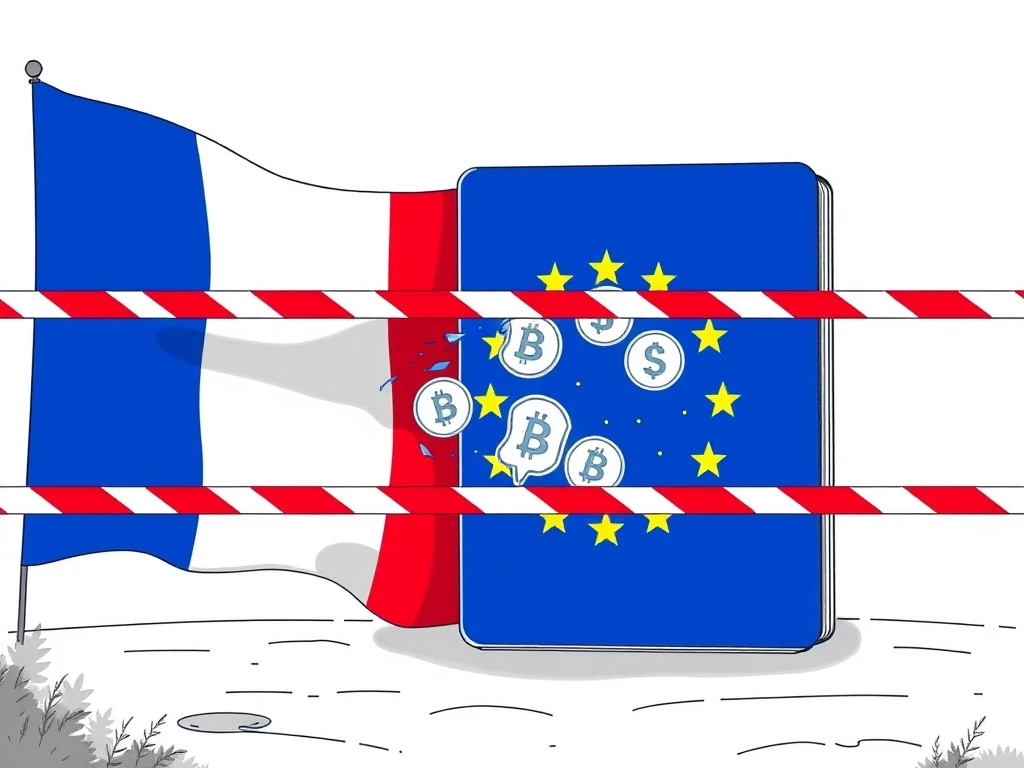Crucial Warning: France Threatens Block on EU Crypto Passporting Amid MiCA Regulation Concerns

The landscape of European cryptocurrency regulation faces a significant challenge. France has issued a crucial warning, indicating it may block crypto firms operating locally under licenses obtained in other European Union countries. This move stems from growing concerns about potential enforcement gaps within the groundbreaking MiCA regulation, the EU’s comprehensive framework for crypto assets. This development could profoundly impact how crypto firms conduct business across the 27-nation bloc, especially regarding EU crypto passporting.
France Raises Alarms Over MiCA Regulation Enforcement
France’s securities regulator, the Autorité des Marchés Financiers (AMF), recently voiced its apprehension. The AMF is concerned about potential regulatory enforcement gaps tied to Europe’s Markets in Crypto-Assets Regulation (MiCA). This framework, the world’s first comprehensive crypto regulatory framework, became effective for crypto-asset service providers in December 2024. However, the AMF fears that some crypto firms might seek licenses in more lenient EU jurisdictions, potentially undermining the framework’s integrity.
Marie-Anne Barbat-Layani, the chair of the AMF, explained the situation to Reuters. She stated, “We do not exclude the possibility of refusing the EU passport.” Barbat-Layani described this action as “very complex,” comparing it to an “atomic weapon” for the market. She noted that crypto firms are actively searching for a “weak link” among European jurisdictions. They seek a “license with fewer requirements than the others.”
Understanding EU Crypto Passporting Under MiCA
Under the MiCA framework, a company authorized in one member state can utilize a ‘passport’ to operate across the entire 27-nation bloc. This system aims to create a unified market for crypto services, fostering innovation while ensuring consumer protection. However, France’s recent warning highlights a critical fear: uneven standards across member states could significantly undermine this unified approach. Therefore, the integrity of EU crypto passporting relies heavily on consistent enforcement.
The core principle of MiCA is to standardize rules for crypto-asset service providers (CASPs) throughout the EU. This standardization intends to:
- Enhance investor protection.
- Ensure market integrity.
- Promote financial stability.
- Foster innovation in a regulated environment.
However, if national regulators interpret or enforce MiCA differently, the ‘passporting’ mechanism could inadvertently create regulatory arbitrage. This would allow firms to choose the path of least resistance rather than adhering to the spirit of the law.
The Push for Stronger ESMA Crypto Supervision
France is not alone in its concerns. The country has become the third to advocate for the European Securities and Markets Authority (ESMA) to oversee major crypto firms. Austria’s Financial Market Authority and Italy’s financial markets regulator, Commissione Nazionale per le Società e la Borsa, have also called for regulatory supervision to shift to ESMA. This collective call underscores a broader European apprehension about the current state of crypto firm licensing and oversight.
These three nations have also backed revisions to the existing MiCA framework. Their proposals include:
- Stricter rules for crypto activities originating outside the EU.
- Stronger cybersecurity oversight for crypto operations.
- A thorough review of how new token offerings are regulated.
The debate intensified following criticisms of Malta’s crypto licensing regime. In July, ESMA released a peer review of the Malta Financial Services Authority’s (MFSA) authorization of a crypto service provider. The review concluded that the Maltese regulator only “partially met expectations.”

Following this assessment, ESMA’s ad hoc Peer Review Committee (PRC) made several recommendations. The PRC urged the MFSA to “assess material issues that were pending at the date of the authorization or that have not been adequately considered at the authorization stage.” Additionally, the committee advised the MFSA to “monitor closely the growth in authorization applications” and to adjust supervisory practices promptly.
The Future of France Crypto Regulation and EU Unity
The proactive stance taken by France regarding France crypto regulation highlights a crucial tension within the EU. The bloc aims for a harmonized market, but national regulators still grapple with varying interpretations and enforcement capacities. This situation creates a delicate balancing act between fostering innovation and ensuring robust consumer protection and financial stability. The potential refusal of the EU passport by France could set a precedent, compelling other member states to re-evaluate their own regulatory rigor.
For crypto firms, this means that merely obtaining a license in one EU country might not guarantee seamless operation across the entire bloc. They must now consider the potential for national-level scrutiny, even with MiCA’s overarching framework. This scenario underscores the ongoing evolution of global crypto regulation and the challenges of achieving true harmonization.
The call for increased ESMA crypto supervision suggests a growing desire for a more centralized and consistent approach to enforcing MiCA. If ESMA were to take a more direct role in overseeing major crypto firms, it could alleviate concerns about national enforcement gaps. This would potentially strengthen the integrity of the MiCA framework and provide greater clarity for businesses operating within the EU. Ultimately, the outcome of these discussions will shape the future of crypto adoption and regulation across Europe.







